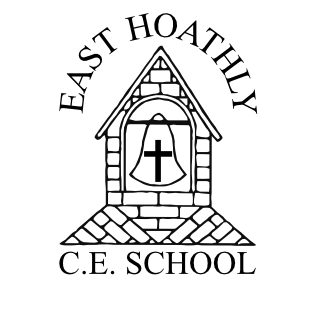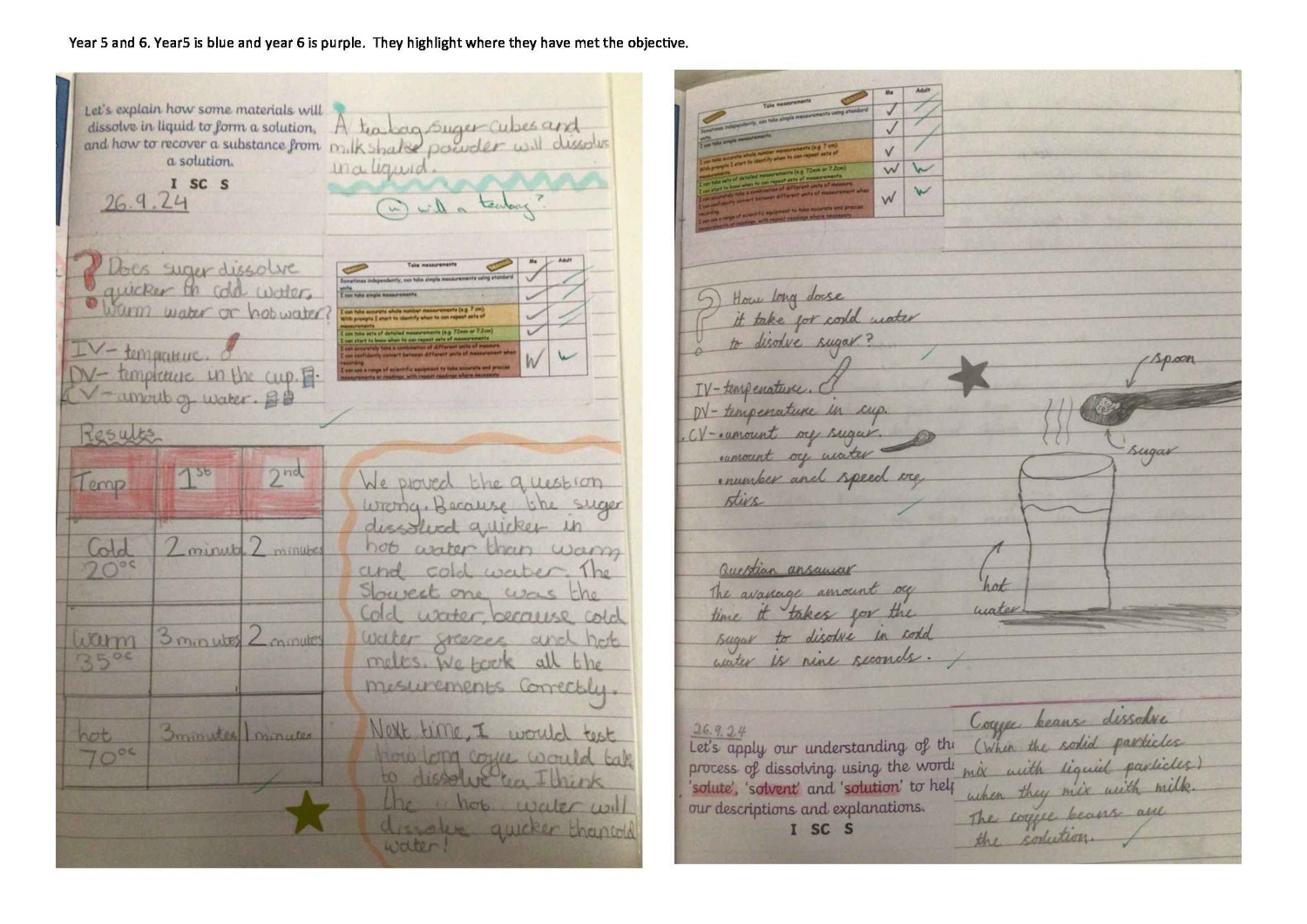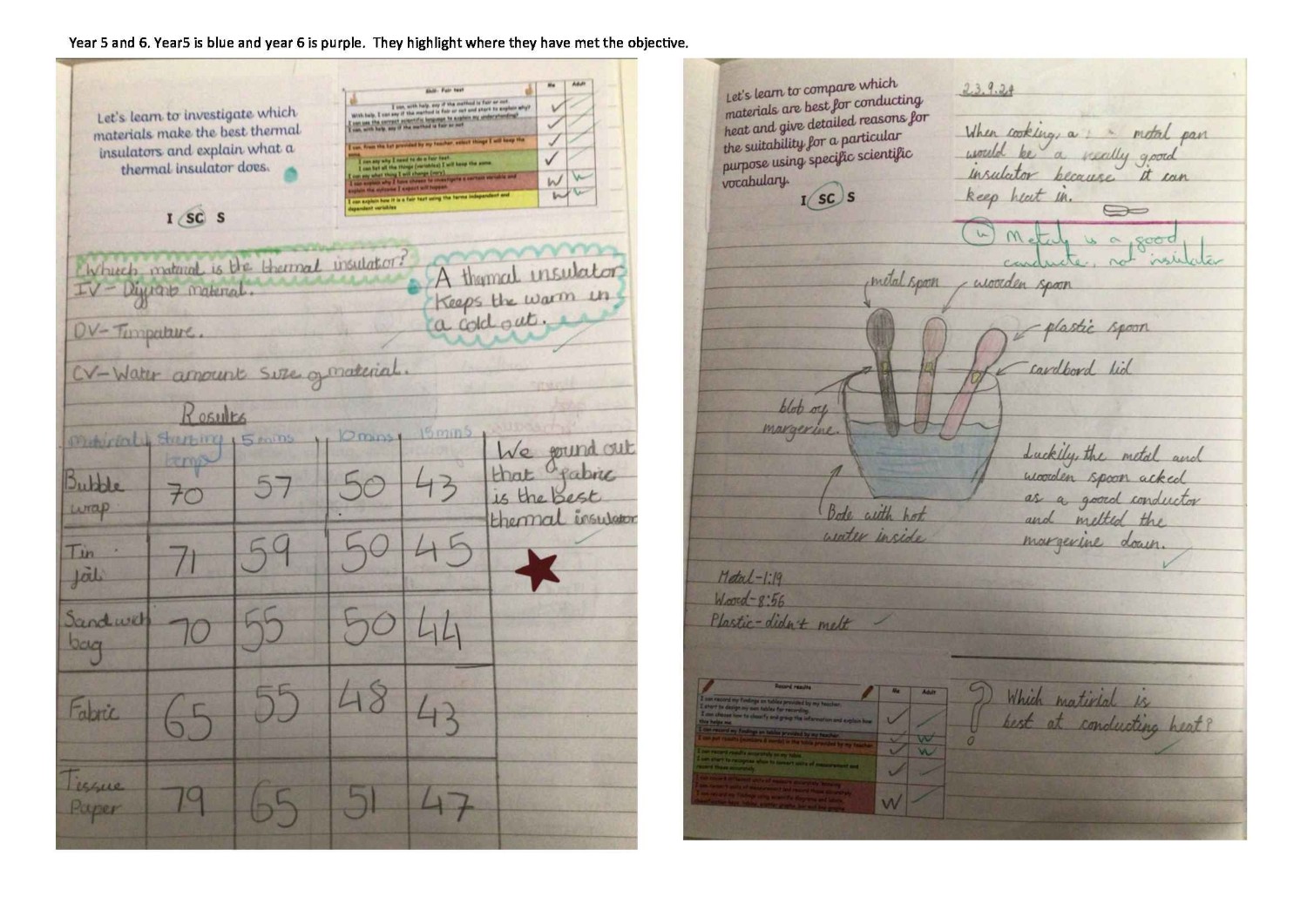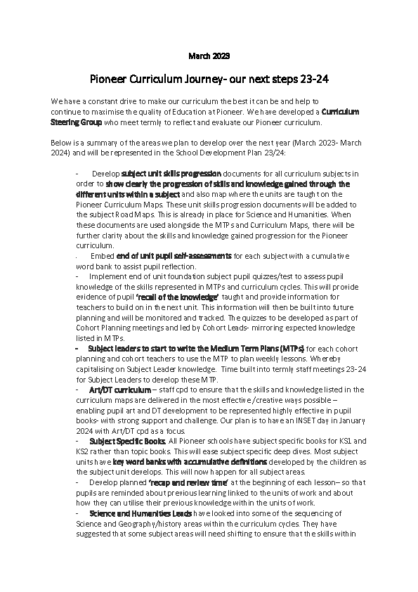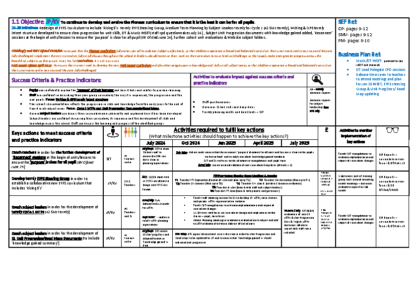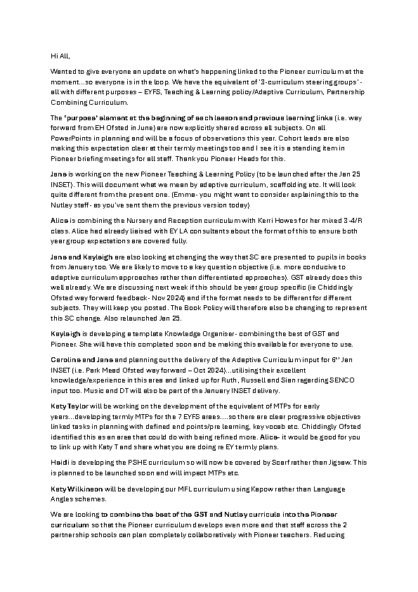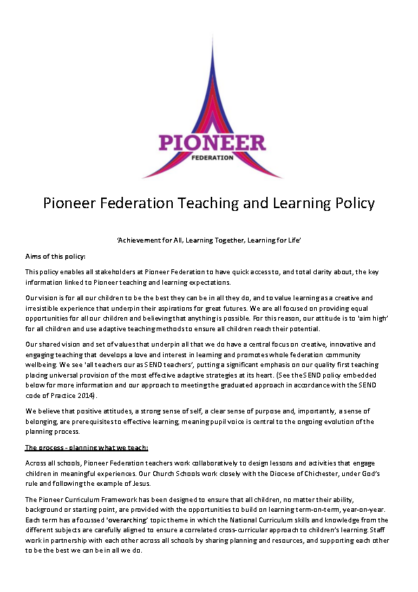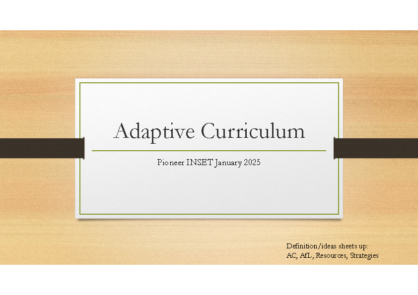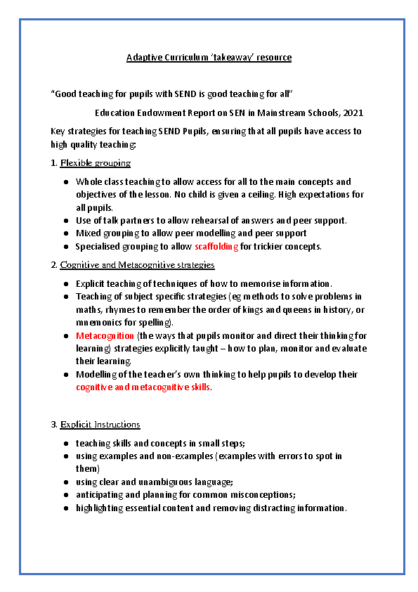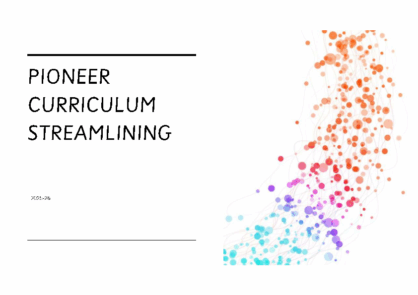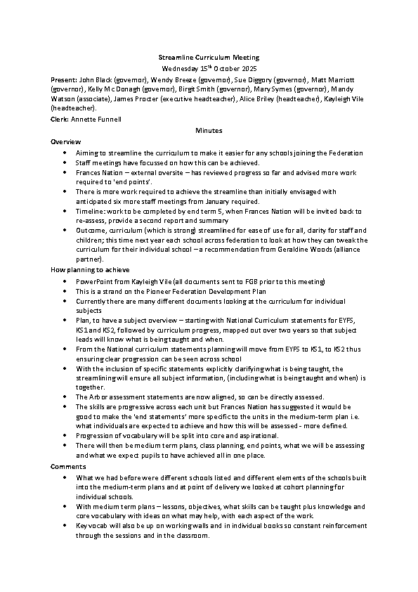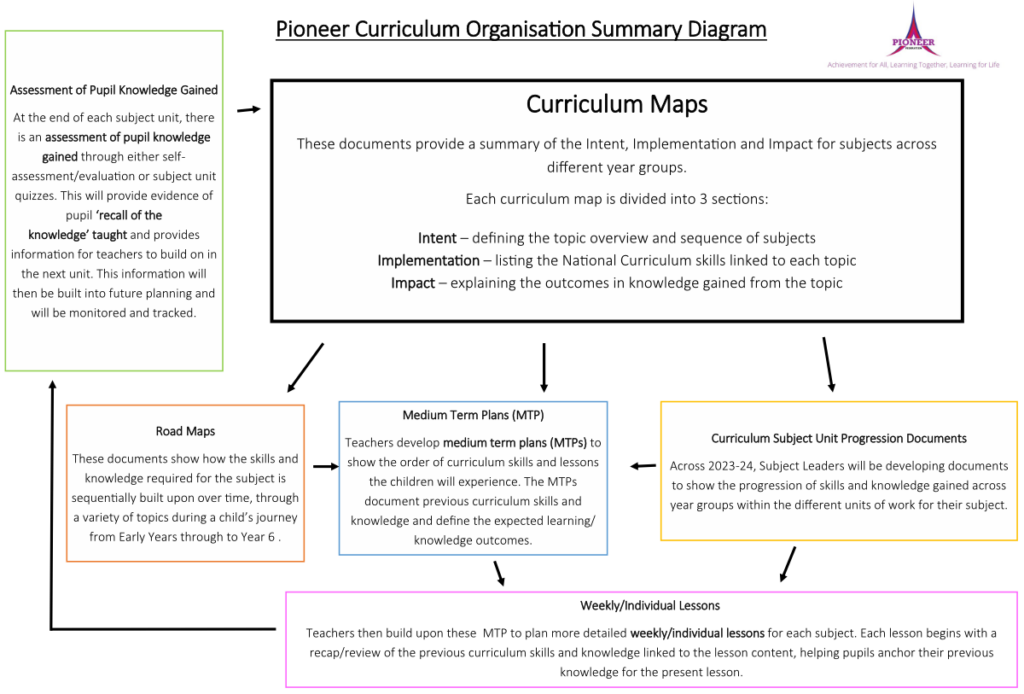
‘The Pioneer curriculum offers pupils a rich and varied diet.” – East Hoathly Ofsted 2018
‘The Pioneer curriculum is a strength and is fit for the future.” – Chiddingly Ofsted 2019
‘Leaders have designed an interesting, varied and ambitious Pioneer curriculum for all pupils.’ – St Mary’s Ofsted March 2020
‘The school’s ambitious curriculum is well-designed and logically sequenced. Pupils build on their prior learning well. As a result, their skills and knowledge become increasingly sophisticated.’ – East Hoathly Ofsted June 2024
‘The school and the federation it is part of have worked skilfully together to design an ambitious curriculum. It is clearly sequenced and planned so that new concepts build on prior learning. The school has identified the important knowledge and subject content that they want all pupils to learn
and remember. This helps teachers know what to teach and to explain curriculum content clearly.’ – Park Mead Ofsted October 2024
‘The school’s curriculum is designed to meet the needs of all pupils. It is ambitious and clearly identifies what teachers need to teach within each subject.
Adaptations for pupils with SEND are effective. This means that every pupil can learn the curriculum and achieve well. Staff have a strong subject knowledge and are confident to teach the curriculum. This has been supported by the work and training across the federation.’ – Chiddingly Ofsted November 2024
Pioneer Federation ‘Mixed-Year Group’ Curriculum Design
How do we ensure that there is clarity of expectation for all year groups within our mixed year group classes and enable ‘sufficient opportunities’ for all year groups to deepen their understanding in all curriculum subjects?
- We have designed a Pioneer curriculum that provides clarity about year group expectations within our mixed year group classes and we deliver lessons that offers high aspiration and appropriate adaptions/scaffolding. (See Teaching & Learning Policy 2025)
- The curriculum is therefore planned and designed so that the children are able to access learning at their own level/ability.
- Pioneer staff recognise the importance of the ‘stage of learning for individuals’ whilst also being mindful of the ‘year group expectations’.
- We define the progressive skills and knowledge gained for all year groups within the ‘Pioneer skills unit progression documents’. These skills progression documents link directly with the 2 year curriculum overview cycles (A & B), which caters for all year groups- defining the expected outcomes for the mixed year classes linked to the national curriculum expectations for each key stages.
- The Pioneer subject leaders design medium term plans to cater for year group coverage within the mixed year group class. Lesson plans identify aims of both year groups and we make sure all learning is covered over the two years, taking the learning objective for each lesson and extend or support for the two different year groups.
- Pioneer summative assessment activities and assessment tracking (linked directly to curriculum cycles and unit progression plans) are year group specific so that attainment can be measured against the child’s specific year group attainment expectations.
- For some subjects/lessons the learning tasks can sometimes be more open-ended, exploratory and problem-oriented and there could be barriers to offering discreet year group objectives, however Pioneer staff have the ‘curriculum year group expectation awareness’ when adapting/assessing the learning in these lessons.
- Some subjects provide aspects of discrete year group objectives. For example in Science, we designed the curriculum based around substantive and disciplinary teaching. The substantive knowledge builds up the skills of scientific enquiry and these are tracked using our planned skills stickers which start at Year 1 and build through to Year 6. This ensures continuity and progression through the enquiry skills. These are used in every lesson and one or two are chosen depending on the lesson focus. At the end of the lesson, a teacher will assess the skills using these stickers, they build up in knowledge so you clearly see the assessment made for each year group linked to the work/quotes taken from the children. The disciplinary knowledge is then taught in sequence and as we teach on a 2 year cycle, we make sure all learning is covered over the two years but we also take the learning objective and extend or support for the two different year groups. For example in Year 1 they learn about the senses, however by Year 2 they will have more knowledge about the senses so deepen their learning alongside new knowledge. So when we plan we would have two year group objectives and they are colour coded and can be used for the year groups, however if a child in the lower group shows understanding within the higher one they could achieve this and use this sticker. This will mean the children are taught the same lesson but the outcomes in the book are different and the depth of knowledge will be extended as appropriate.
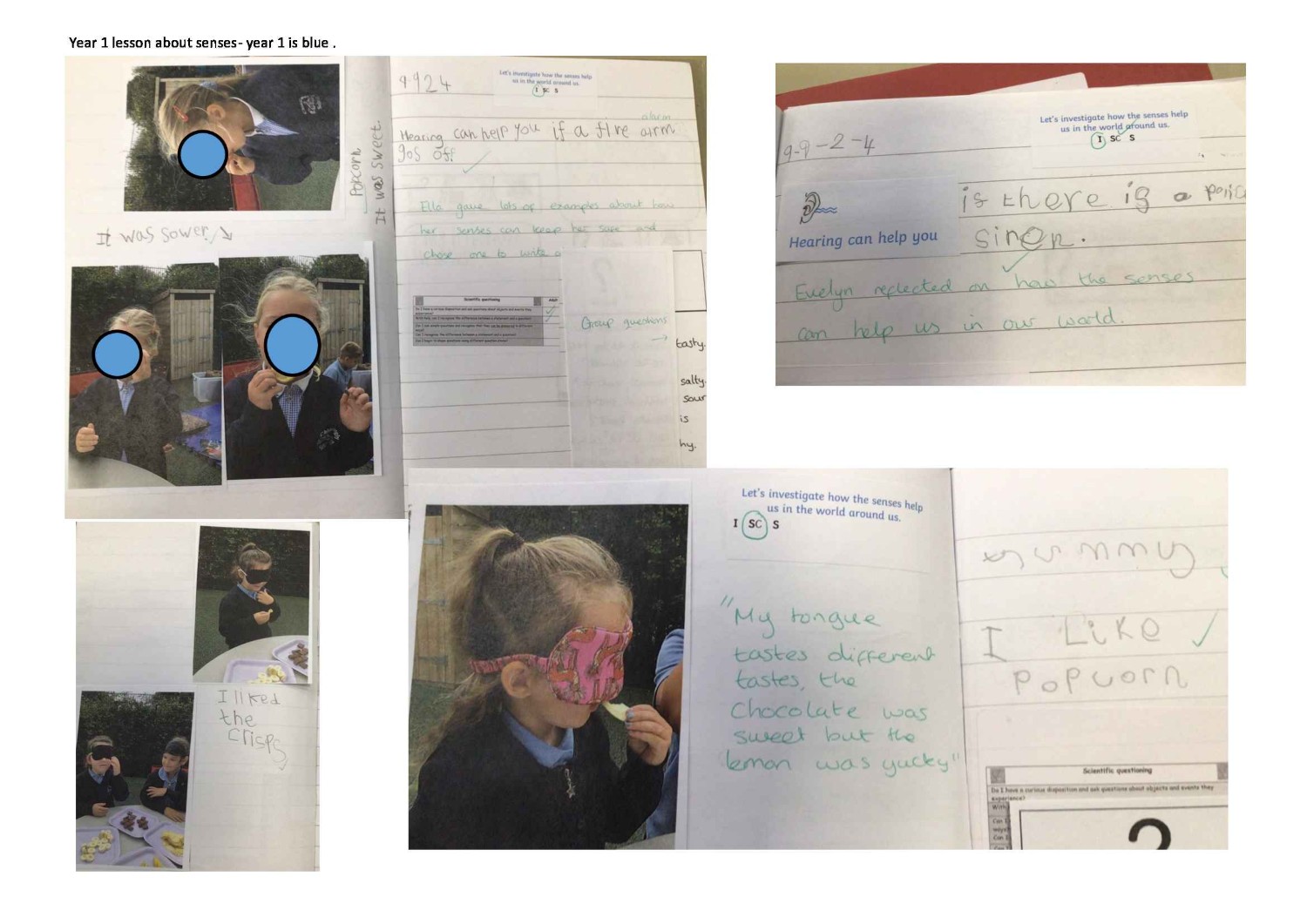
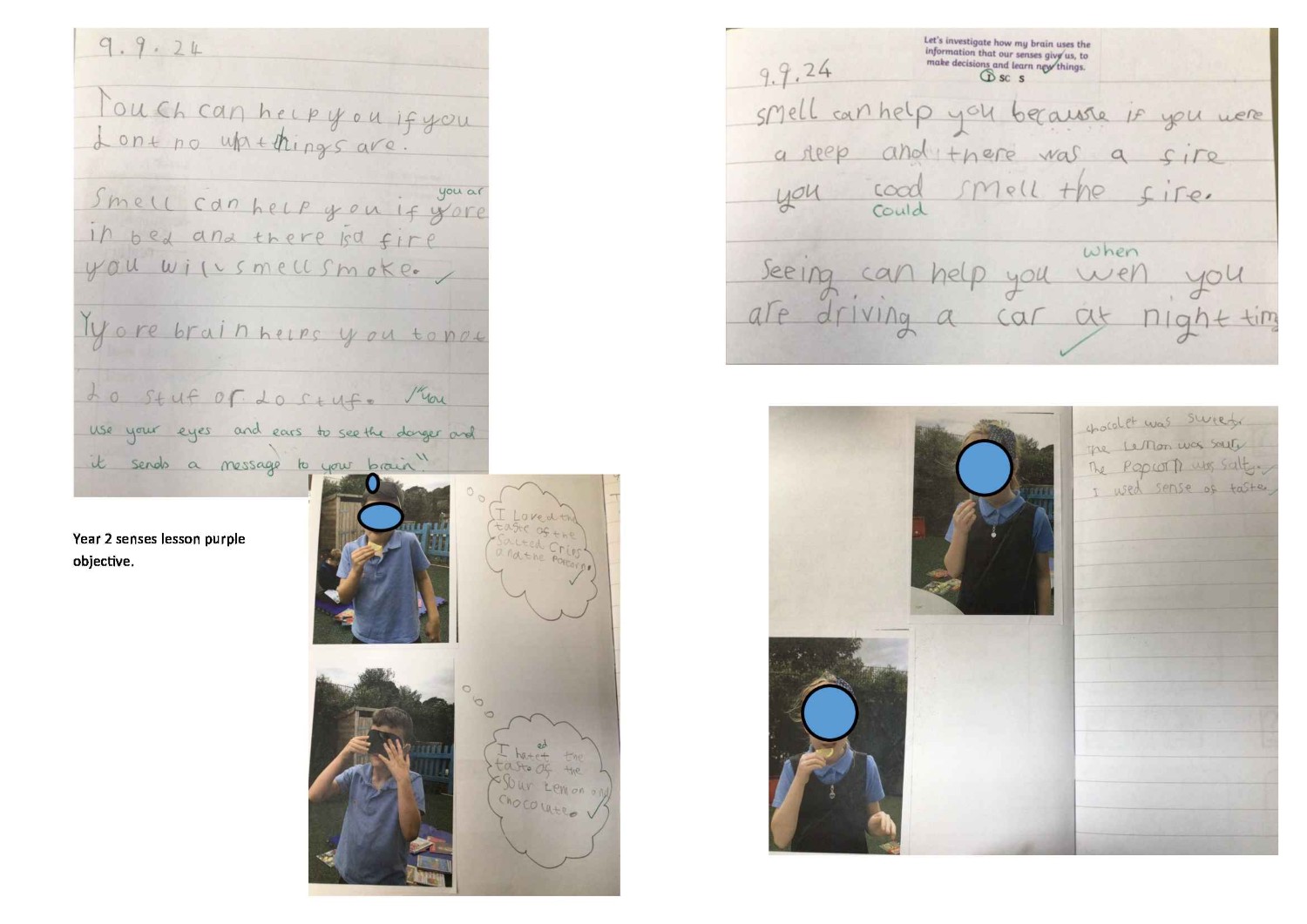
Organisation
Our exciting, broad and balanced curriculum is taught through a two-year cycle for each cohort. Click below to see the two-year cycles.
- Click here to see KS1 & KS2 Curriculum Maps (Cycle 2 has recently been updated July 2023 so we have developed an archived folder for the previous maps for reference. Cycle 1 updates will be happening Autumn 2023)
- Click here to see EYFS Curriculum Maps
Each term has a focussed topic theme in which the National Curriculum skills and knowledge from the different subjects are carefully aligned to ensure a correlated cross-curricular approach to children’s learning. Before each topic begins, teachers find out what pupils already know and what they would like to find out about. Teachers use this information to influence their planning of the topics.
Each curriculum map is divided into 3 sections:
- Intent – defining the topic overview and sequence of subjects.
- Implementation – listing the National Curriculum skills linked to each topic.
- Impact – explaining the outcomes in knowledge gained from the topic.
‘Enrichment Days’, ‘Forest School’ and ‘Bespoke Curriculum Events’ are timetabled to further enrich our curriculum and enable us to cater for current global affairs and issues. See Weekly Newsletters and the Curriculum Events and Forest School tabs on the websites for evidence of these curriculum events.
Information about the National Curriculum can be found here .
Content and Sequence
The Pioneer Curriculum Framework has been designed to ensure that all children, no matter their ability, background or starting point, are provided with the opportunities to build on learning term-on-term, year-on-year. All aspects of the National Curriculum are included in our two-year rolling framework to ensure all year groups are taught the skills and knowledge aimed at their age group.
Within the curriculum maps, the Maths and Literacy units of work are sequenced to ensure coverage of all areas.
All subject books will have a Subject Specific Toolkit at the beginning. This will list the overall skills the children need to be successful in the subject. i.e. ‘What does a Pioneer Scientist, Historian, Geographer etc look like?’.
All subject termly units will start with a ‘Subject Cover’ which includes key vocabulary and what the children already know and will end with a ‘Subject Unit Quiz’. These will be provided by the subject leaders. The key vocabulary words will be defined and written in by the pupils when they are introduced to them throughout the unit of work. Teachers will use the information from the end of term subject quizzes to adapt the next linked unit to address and gaps in unit skills. All termly Pioneer Cohort Meetings will start by evaluating the previous term subject Medium Term Plans (MTPs) and then adapting the next unit from this information.
Opportunities for the children to explain what they already know about a unit of work will be provided for below the Key Vocabulary Sheet at the beginning of the unit. This will provide teachers with a reminder of pupil baseline of knowledge for the unit of work and also something to reflect back on after the unit quiz has been completed. The quizzes will also have an opportunity for greater depth knowledge recall by asking the children to reflect on what they have learnt linked to the overall subject big question for the term’s work (represented in MTPs), making progress explicit.
Some of the key texts are listed within the curriculum maps and our ‘Pioneer Approaches to Reading‘ identifies ‘core’ and ‘supplementary’ text that children will experience to ensure they are exposed to a wide variety of rich texts throughout their primary years (including poetry, classic books and stories linked to topics).
The rationale for the sequencing of this curriculum has been organised with a variety of factors in mind:
- Weather Conditions/Time of the year – Some topics are more suited to certain weather conditions. For example, ‘Plants’ studied in science, and the final EYFS topic based around ‘Summer’ occur in the Summer terms to provide hands-on learning opportunities. Some topics are in terms where anniversaries or celebrations occur. For example, ‘The Shang Dynasty of Ancient China’ is in January to include learning about Chinese New Year; and the ‘World War Two’ topic in November allows for a focus on Remembrance Day.
- Local studies/cultural capital – Some topics are selected because of the cultural capital and locality of the schools. For example, ‘Where in the World are we?’ Why is our local river significant? and ‘What Happens Where I Live?’ Trips are also chosen carefully to ensure the children become familiar with landmarks and places of interest in their immediate vicinity. For example, a Hartfield trip when learning about Winnie The Pooh; Hever Castle during the Tudor topic and visiting Cuckmere Haven when learning about rivers in Year 3 and 4. All classes also make regular use of their local outdoor spaces during Forest School sessions.
- Similar focus across all classes – Some parts of the curriculum are similar across the school to allow a whole-school approach, in order to build on previous skills learned. For example, Online Safety lessons are taught in every term as well as within e-safety week.
Numerous opportunities for enrichment ensure that children are actively involved in their learning, with hands on experiences ensuring skills and knowledge are embedded and learning for life is achieved.
Teachers work in federation cohort teams to plan the sequence of lessons for each term. Pioneer Subject Leaders provide Medium Term Plans (MTPs) for each cohort to plan from. MTPs show the order of curriculum skills and lessons the children will experience. Teachers then build upon these to plan more detailed weekly/individual lessons for each subject. The MTPs will also document how the individual and unique ‘Cultural Capacity’ of each school will be represented within the subject for the term.
Topics are evaluated at the end of a term by the class to refine and improve the content for subsequent cohorts, whilst still ensuring the core sequencing of knowledge and skills remain.
Subject leaders across the federation have created Curriculum Road Maps. These documents show how the skills and knowledge required for the subject is sequentially built upon over time, through a variety of topics during a child’s journey from Early Years through to Year 6.
Across 2023-24, Subject Leaders will be developing Unit Progression Documents to show the progression of skills and knowledge gained across year groups within the different units of work for their subject. These unit progression documents can be used alongside the Curriculum Maps, Road Maps and Medium Term Plans to ensure clarity about the curriculum skills and knowledge gained with the Pioneer Curriculum.
Impact and Knowledge-Gained
Each of the curriculum frameworks list the impact and knowledge-gained from each curriculum area, every term. This learning is evidenced through children’s books and the experiences documented throughout the topic journey. Teachers assess children’s knowledge throughout a unit or work and also summatively at the end of each subject unit through subject quizzes and pupil self-reflection. They use these outcomes to plan how to develop progression in the future.
Newsletters and the Curriculum Events section of the website will include statements from staff and children to demonstrate the new understanding gained from the variety of enrichment activities and experiences provided.
Subject Leaders monitor the Quality of Education for their curriculum area in each school by regularly leading deep dives. These include observing lessons and carrying out books and planning audits. SLT triangulates the Quality of Education termly for each teacher.
Click to access the Curriculum Events page for Park Mead | Chiddingly | East Hoathly | St Mary the Virgin
Pioneer Curriculum Journey – Our Next Steps 2023-24
We have a constant drive to make our curriculum the best it can be and help to continue to maximise the quality of education at Pioneer. We have developed a Curriculum Steering Group who meet termly to reflect and evaluate our Pioneer curriculum. Click below to see a summary of the areas we plan to develop over the next year (March 2023- March 2024).
Pioneer Curriculum Journey – Our Next Steps 2024-25
Click the action plan below to see a summary of the areas we plan to develop over the next year (September 2024- March 2025).

























